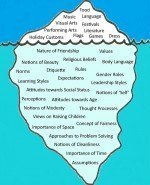Author: Merica McNeil
 Want to talk about culture with your students, but not sure how to break the ice? As a starting point, it can be helpful to find out about their ideas regarding culture and the basis for these ideas. For example, what experiences have they had encountering other cultures? What challenges did they have? How did they deal with these challenges? What were the results? If they knew then what they know now, would they have dealt with the situation differently? If so, how? Discussing questions such as these, especially involving critical incidents, can help set the stage for starting to develop intercultural competence.
Want to talk about culture with your students, but not sure how to break the ice? As a starting point, it can be helpful to find out about their ideas regarding culture and the basis for these ideas. For example, what experiences have they had encountering other cultures? What challenges did they have? How did they deal with these challenges? What were the results? If they knew then what they know now, would they have dealt with the situation differently? If so, how? Discussing questions such as these, especially involving critical incidents, can help set the stage for starting to develop intercultural competence.
Since I had attended CERCLL’s Language Teacher Symposium led by Dr. Carmen King de Ramírez on March 8 on cultural intelligence activities (see details), I knew it was important to engage students in the discussion and find out the origins of their beliefs about other cultures. For example, are their beliefs based on their own experiences or from what they have heard others say about another culture? Carmen kept workshop participants engaged by providing a variety of practical activities that can be used to increase students’ cultural intelligence. She explained and demonstrated a variety of activities, and she also provided a packet of handouts to help teachers be able to implement activities in their classes.
When a colleague was looking for somebody to guest teach a lesson on the link between language and culture, I jumped at the opportunity. Instead of lecturing this class of university students on the chapter on this topic in their course textbook (Basics of Language for Language Learners), their teacher and I decided it would be more appropriate to help this group of students activate their background knowledge of culture based on their experiences. My lesson plan and Powerpoint are attached. Feel free to adapt them to suit your needs.
Lesson Plan: Culture and Language
Powerpoint: Language and Culture
Reference: Culicover, P. & Hume, E. (2010). Basics of language for language learners. Columbus, OH: The Ohio State University Press.
Image: Penston, J. (n.d.). Visualising the iceberg model of culture. Retrieved from http://opengecko.com/interculturalism/visualising-the-iceberg-model-of-culture. James Penstone / CC BY-NC-SA 2.0

